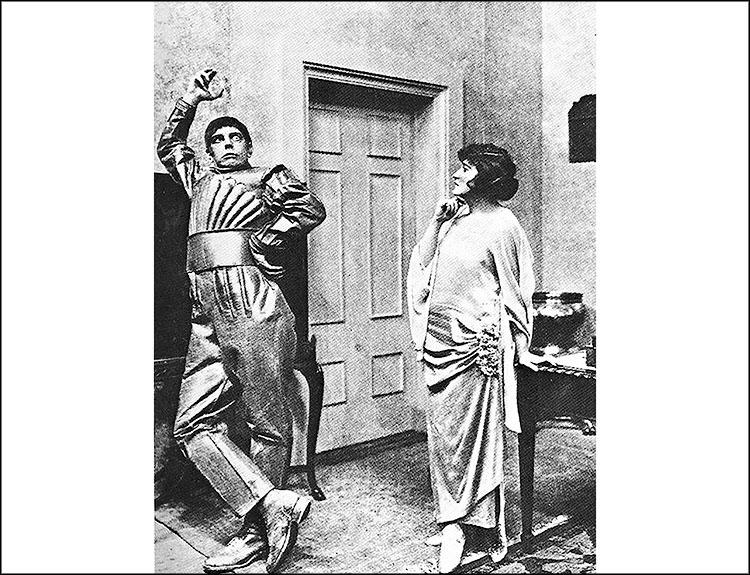If you haven’t heard of the play “R.U.R.,” written in 1920 by the Czech playwright Karel Capek, you are not alone. Writing for the MIT Press Reader, John M. Jordan said, “Few people today know ‘R.U.R.’ But in its time, the play was a sensation, with translations into more than 30 languages immediately after publication. Over 100 years on, apart from our obvious reliance on the play’s terminology and worldview, we still hear its echoes.” It was the first play to introduce the word “robot” to theatrical audiences.
Playwrights’ Theatre of East Hampton, at LTV Studios in Wainscott, will present a staged reading of the play (whose full title is “Rossumovi Univerzalni Roboti (Rossum’s Universal Robots)”) on Sunday afternoon at 4.
How “R.U.R.” came to LTV is a story in itself. It involves Playwrights’ Theater, which was founded here in 1992 by Mitzi Pazer, a producer and Springs resident from the Roundabout Theatre Company, and Perry Pazer, her husband. It ended before the pandemic.
“Perry, at 94, is still absolutely sharp and gave a gift to support Playwrights’ Theatre’s ongoing legacy at LTV, which has been very generous,” said Josh Gladstone, LTV’s creative director and interim executive director. “In talking with him recently he said he did this play, ‘R.U.R.,’ in high school. He loved it and would like to see it again because it was so important to him as a kid.”
Mr. Gladstone knew the play from a reading he’d organized some 15 years ago at Guild Hall. “Perry said he wants to see the play so much that he would take a Jitney to East Hampton. He hasn’t been here since before the pandemic, so I decided we’ve got to do it. Because Playwrights’ Theatre was such a big part of the cultural landscape here for a good 20 years, the production is a chance for people who remember him to come and say hello.”
By the time the play premiered in Prague in 1921, Capek was a well-known Czech intellectual. According to Mr. Jordan, “Like many of his peers, he was appalled by the carnage wrought by the mechanical and chemical weapons that marked World War I as a departure from previous combat. He was also deeply skeptical of the utopian notions of science and technology.”
After the premiere, Capek told The London Saturday Review that “the product of the human brain has escaped the control of human hands. This is the comedy of science.” He went on to characterize Rossum, the robots’ inventor, as a scientist untroubled by metaphysical ideas. “He is not concerned to prove, but to manufacture.”
The play, then, is a critique of mechanization and its power to dehumanize. One character, Helena, is sympathetic to the robots, wanting them to have their freedom. The robot Radius bristles at the foolishness of his makers, and eventually leads a revolt that results in the death of all but one of their masters.
The word “robot” derives from the Czech word “robata,” which means forced labor, as done by serfs. (Its Slavic root, “rab,” means “slave.”)
Mr. Jordan, who is the author of the book “Robots,” published by MIT Press in 2016, observes in his article, “The contrast between robots as mechanical slaves and potentially rebellious destroyers of their human makers echoes Mary Shelley’s ‘Frankenstein’ and helps set the tone for later Western characterizations of robots as slaves straining against their lot, ready to burst out of control.” He adds that the duality echoes throughout the 20th century, citing “The Terminator,” HAL 9000 from “2001: A Space Odyssey,” and the replicants from “Blade Runner.”
Sunday’s reading is directed by the actor John Kroft, who can be seen as Montag, a main character in Bay Street Theater’s current production of “Fahrenheit 451.” Mr. Kroft made his directorial debut with “God of Carnage” at LTV last spring; his acting resume includes the film “Maestro” and such television shows as “Blue Bloods” and “Red Oaks.”
The cast includes Max Samuels, Ana Restrepo, Carly Cooper, Cameron Eastland, Matt Conlon, Joe Pallister, Paul Hecht, Edward Kassar, Antoinette Lanza, and Mr. Gladstone.
“It’s an interesting piece,” said Mr. Gladstone. “It’s retro-futurist sci-fi from a hundred years ago.” Because it’s a staged reading, there will be no costumes, no futuristic set. Asked if there would be a robot, he said, “There will be about six of us.”
Tickets are $15, $20 at the door, $35 for cafe table seating with a drink. Students with ID get in for $10.




